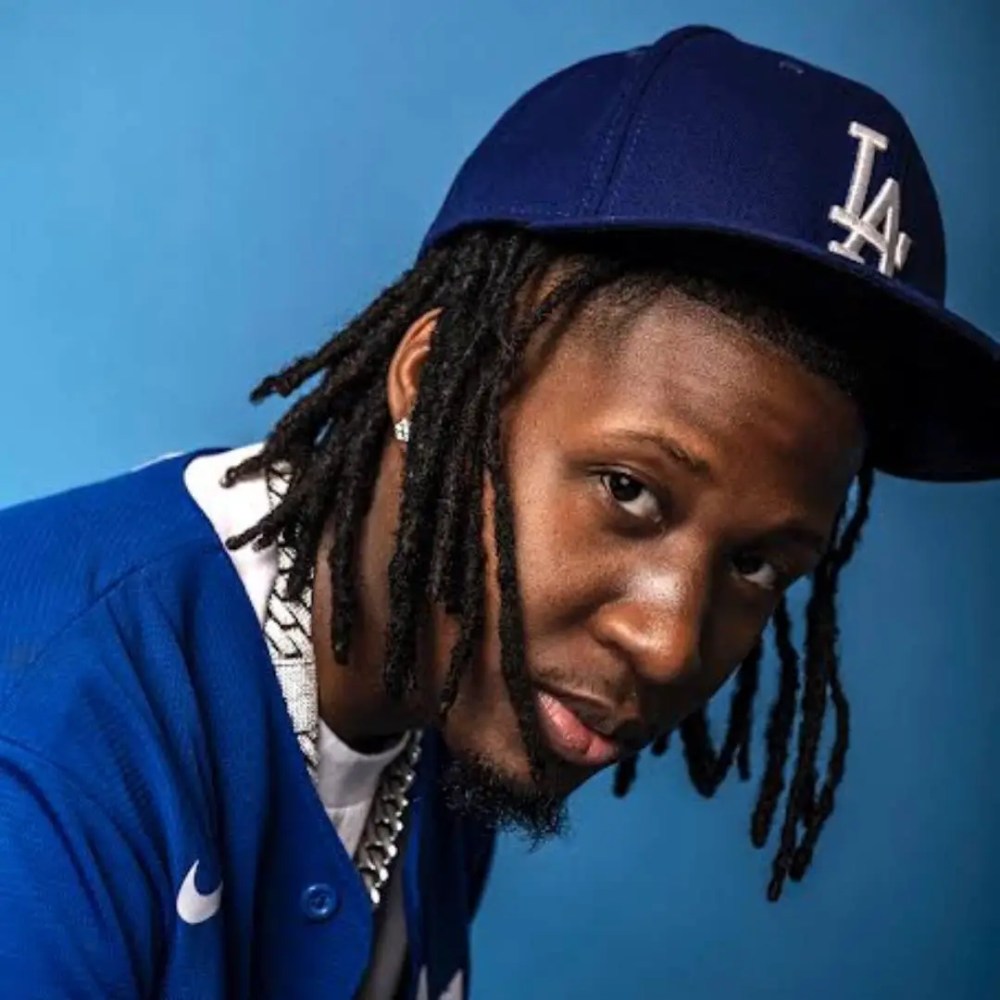Image via Jelissa Holder
When it comes to mixtape covers, Low the Great keeps it personal. On his trilogy of solo releases titled, Vicky, the 27-year-old producer channelled his close bond with his late grandmother of the same name. Each cover features a photo of Vicky’s former house, where he partly grew up. A month before his late grandmother’s birthday last December, Low dropped the final installment of the trilogy. Interspersed with samples of her voice, Vicky 3 is both an ode to the person who provided him access to his first computer—the catalyst for his music career—as well as a love letter to the city that raised him.
Low’s studio is a cavernous room tucked off a busy thoroughfare in Southeast LA. You’ve probably heard his, “Low The Great!” tag sprinkled into the dozens of anthems he’s helped craft for L.A.’s rap renaissance of the last decade: Shoreline Mafia and Wiz Khalifa’s “How We Do It,” Blueface’s “Famous Cryp,” Drakeo The Ruler and Stupid Young’s “Lil Boosie,” BlueBucksClan’s “Walking In,” and 1TakeJay’s earworm homage to the iPhone, “Hello.” [honorable mention goes to Boosie Badazz, “On A Dick.”] As an autodidact with an unwavering work ethic, Low has proven himself as one of the most significant producers in LA.
Given the personal significance of the series, Vicky 3 is Low’s most realized work to date. There’s bouncy, eyes-on-a-swivel scrolls of rumination (“Drip Down” with Baby Stone Gorillas and SlumLord Trill), and long-money soundtracks for parties on Loma Vista Dr (“Big Mozzarella” with G Perico and Royce The Choice), capturing the city’s assorted demeanors and disparate voices. During our interview, Low describes using Vicky’s saved voicemails as intros and outros to give the album, and himself, a sense of closure. “My Grandmother came to me and told me it was time to release,” he tells me over the crashing of live drums in the studio next door.
Growing up, Low moved around L.A. frequently. When his mother and father separated, he switched from 52nd Elementary to Normandie Avenue. Eventually, splitting time between South Central and East L.A., he enrolled at Crenshaw High School. This period of jumping around during adolescence gave him exposure to a vast array of interests; he skated, played football, ran track, and sold juice and chips after school. By high school, he’d formed a large network of friends from all over. Even with cousins tied to Blood gangs, and his mother and father’s family from different Crip sets, Low never chose a side. Instead, he followed his instinct to just be himself. It wasn’t until after Crenshaw High, when a friend named Butter introduced him to beatmaking on FL Studio, that Low realized his life’s calling.
He started cutting beats vigorously on his Grandmother’s desktop PC, which soon became so swamped with viruses that she graciously gifted Low a laptop for Christmas. From there, he landed his first beat placement on Rafly The Plug’s “Proper Instructions.” This caught RonRon’s attention, who invited Low to join his HitMob production collective, widely recognized for helping shape L.A.’s traffic/nervous music scenes, made most popular through the sorcery of 03 Greedo, Shoreline Mafia, Ralfy The Plug, and the late Ketchy The Great and Drakeo The Ruler.
Low credits HitMob, especially RonRon and Joog, with playing a big role in his career trajectory. He brings up the small details: sharing drum kits and plugins, studio time, and $5 pizzas when the fatigue of hunger took over all creative capacity. All out of genuine comradery. While differences eventually set in, leading Low to split from the group, it’s still amicable. He doesn’t consider the fallout anything more than distance. Since branching off, Low is poised to enter the next phase of his career. As CEO of Low The Great Records, he recently signed a producer, IsThatTrey, and currently manages CaliRant, who takes lead on the Azjah assisted “Two Steps Forward,” a standout from Vicky 3. – Evan Gabriel
(This interview has been condensed and edited for clarity.)

